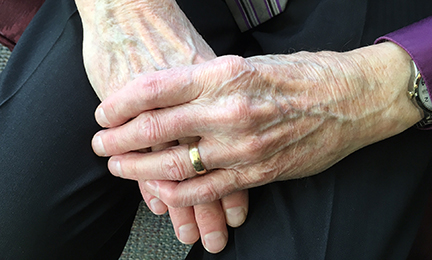Health care professionals enter people’s lives during challenging times, at high points, and everything in-between. Learning how to interact with patients is among the many skills needed.
An elective course in the Department of Allied Sciences in the NDSU College of Health Professions provides students in radiologic sciences, respiratory care, sonography and medical lab science an opportunity to build such skills.
For Hali Johnson, the one-credit class led to something unexpected.
The eight-week, service-learning course called “Understanding and Developing Compassion in Patient Care” includes coursework and invited speakers. Students examine perspectives on compassion and the role it plays in health care. They apply what they’ve learned through a minimum of 12 hours of volunteer service. 
Johnson, a junior from Harwood, North Dakota, thought the class would be beneficial. She will have frequent patient contact as a respiratory care professional when she graduates. Hali was matched with a resident at Bethany Retirement Living in Fargo.
“We spent the majority of time talking about his life and he would tell me stories,” said Johnson. That led to attending coffee hour and other events.
“As the semester went on, I noticed that we had grown closer as friends,” said Johnson. “I could tell he enjoyed just having someone to talk to because he would get so excited talking about his life.” She also met the resident’s wife and daughter.
“Over the course of the class and visiting my resident, I learned how important it is to have a connection with the patient or whoever it may be,” said Johnson.
What began as a class assignment became an opportunity. Even though she completed the class, Johnson maintains her visits to Bethany Retirement Living. “I love talking to him and I know he enjoys my company,” said Johnson.
In the past three years, approximately 60 students have volunteered.
“There are so many benefits to the residents who participate,” said Jessica Peck, director of Community Life at Bethany Retirement Living. “A few would be the special one-to-one relationship they build providing companionship and support to seniors who need it most,” said Peck.
“These relationships let residents know they are appreciated and they are needed to share their knowledge, experiences, and talents to the younger people of the community,” she said. “Some students still come to see their resident years after they completed their course.”
Peck thinks genuine compassion arises from the course. “Students are able to see and experience different disease processes during different stages. The students then have to adapt and work with the resident, using compassion to move forward with the visit in a kind, positive manner.”
Care is taken when matching students with residents. In one instance, staff matched a pre-med student with a man who had been a pathologist.
“We offer the course to help students at the beginning of their professional development,” said Angeline Walswick, academic adviser and lecturer in the Department of Allied Sciences who created the class.
“It assists students in gaining skills needed when they apply for internships available at 18 accredited, affiliated hospital programs in six states who partner with our program,” said Walswick.
Other students have noted the value of the NDSU class in their course reflections. “This class helped me understand that the health field is right for me. I will no longer doubt that this is what I want to do for the rest of my life,” said one student.
Another Allied Sciences student summarized its impact. “I can read all the science books I want and memorize all the bones in the body, but if I cannot connect with my patients…my work will not mean anything.”


